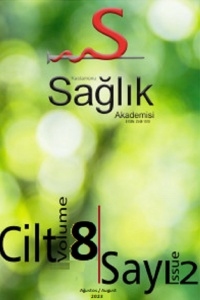Evaluation of Mutual Happiness Situations and Methods of Coping with Family Stress Factors of Pregnant Women
Abstract
Purpose: This study was carried out to evaluate the methods of coping with family stressors and their mutual happiness status of pregnant women living in large and nuclear families.
Materials and Methods: The descriptive type of the study was carried out with 223 pregnant women, 152 of which were nuclear and 71 of them were living in the large family. The data of the study were collected with Personal Information Form, Family Stress Coping Methods Scale and Mutual Happiness Scale (MHS).
Results: It was determined that the average age of pregnant women participating in the study was 27.43 ± 5.90, 31.4% of them were secondary school graduates, 70% of them had a moderate income level, and 83% of pregnancies were planned. It was found that there was no statistically significant difference between the median scores of women who lived in a large and nuclear family (p>0.05). The median scores of Planning, Peer-to-Peer Communication, Cognitive Structuring, Unity Togetherness, Peer-to-Peer Interest subscales of Family Stress Coping Methods Scale were statistically significantly higher in pregnant women living in nuclear families (p<0.05).
Conclusion: As a result of the study; that more than half of the pregnant women were happy. The level of using the methods of Planning, Peer-to-Peer Communication, Cognitive Structuring, Unity Togetherness, Peer-to-Peer Interest werw higher in pregnant women living in nuclear families compared to extended families.
References
- 20) Pishgar, F,. SoleymanJahi, S,. Pishgar, F,. Ardebili, H,. E Jamal, A,. Arab, A. (2016). “Level of happiness and its determining factors in pregnant women: A cross-sectional study”. Journal of Reproductive and Infant Psychology, 34 (5), 431–441. . . . . . . doi:10.1080/02646838.2016.1222071. . . . . ..
Gebe kadınların aile stresörleri ile başa çıkma yöntemleri ve karşılıklı mutluluk durumlarının değerlendirilmesi
Abstract
Amaç: Bu çalışma, geniş ve çekirdek ailelerde yaşayan gebe kadınların aile stresörleri ile başa çıkma yöntemleri ve karşılıklı mutluluk durumlarını değerlendirmek amacıyla gerçekleştirilmiştir.
Gereç ve Yöntem: Tanımlayıcı tipte gerçekleştirilen çalışma 152’si çekirdek, 71’i geniş ailede yaşayan 223 gebe kadın ile gerçekleştirilmiştir. Araştırmanın verileri Kişisel Bilgi Formu, Aile Stresörleri ile Başa Çıkma Yöntemleri Ölçeği ve Karşılıklı Mutluluk Ölçeği ile toplanmıştır.
Bulgular: Çalışmaya katılan gebe kadınların yaş ortalamalarının 27.43±5.90 olduğu, %31.4’nün ortaokul mezunu olduğu, %70’nin gelir durumunun orta düzeyde olduğu ve gebeliklerin %83’nün planlı olduğu saptanmıştır. Geniş ve çekirdek ailede yaşayan kadınların Karşılıklı Mutluluk Ölçeği puan ortancaları arasında istatistiksel olarak anlamlı bir fark olmadığı tespit edilmiştir (p>0.05). Çekirdek ailelerde yaşayan gebe kadınların geniş ailelerde yaşayanlara göre Aile Stresörleri ile Başa Çıkma Yöntemleri Ölçeği alt boyutları incelendiğinde; Planlama, Eşler Arası İletişim, Aile İş Ayrımı, Bilişsel Yapılandırma, Birlik Beraberlik, Eşler Arası İlgi alt boyutları puan ortancaları arasında istatistiksel olarak anlamlı fark vardır (p<0.05).
Sonuç: Çalışmanın sonucunda; gebe kadınların yarısından fazlasının mutludur. Çekirdek ailede yaşayanların eşler arası iletişim, birlik beraberlik, eşler arası ilgi, bilişsel yapılandırma, planlama baş etme yöntemlerini kullanma düzeyi geniş ailelere göre daha yüksektir.
Supporting Institution
Yoktur.
Thanks
Çalışmaya katılan tüm gebelere teşekkür ederim.
References
- 20) Pishgar, F,. SoleymanJahi, S,. Pishgar, F,. Ardebili, H,. E Jamal, A,. Arab, A. (2016). “Level of happiness and its determining factors in pregnant women: A cross-sectional study”. Journal of Reproductive and Infant Psychology, 34 (5), 431–441. . . . . . . doi:10.1080/02646838.2016.1222071. . . . . ..
Details
| Primary Language | Turkish |
|---|---|
| Subjects | Health Care Administration |
| Journal Section | Original research articles |
| Authors | |
| Early Pub Date | September 1, 2023 |
| Publication Date | August 1, 2023 |
| Submission Date | October 5, 2020 |
| Acceptance Date | July 15, 2021 |
| Published in Issue | Year 2023 Volume: 8 Issue: 2 |
Health Academy Kastamonu is included in the class of 1-b journals (journals scanned in international indexes other than SCI, SSCI, SCI-expanded, ESCI) according to UAK associate professorship criteria. HEALTH ACADEMY KASTAMONU Journal cover is registered by the Turkish Patent Institute.


